Report: 13% of Americans Still Believe Men Are ‘Better Suited Emotionally’ for Politics
While the percentage is lower than it’s ever been, it’s high enough to cause candidates to lose elections.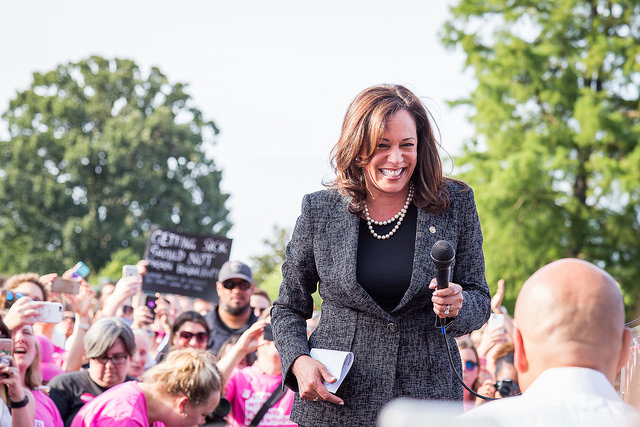 Sen. Kamala Harris, D-Calif. (Mobilus In Mobili / Flickr Creative Commons)
Sen. Kamala Harris, D-Calif. (Mobilus In Mobili / Flickr Creative Commons)
A record number of women are running for president in the 2020 election cycle: six as of April 2019, including Sens. Kamala Harris, D-Calif., Elizabeth Warren, D-Mass., Amy Klobuchar, D-Minn., Kirsten Gillibrand, D-N.Y., Rep. Tulsi Gabbard, D-Hawaii, and Marianne Williamson, a bestselling self-help author and Oprah’s spiritual adviser. There are now more women than ever in Congress.
Despite these recent signs of improvement, a new poll from Georgetown University Center on Education, using data from the General Social Survey, reveals the lingering sexism that pemeates the thinking of American voters, about 13% of whom still believe men are “better suited emotionally” to be in politics.
That number, Benjamin Wermund writes in Politico, “is lower than it’s ever been — and indicates major progress, especially compared with 1975, when nearly 50 percent of Americans held the belief.”
Even 13% however, is high enough, as the report’s authors point out, to “cause candidates to lose elections.”
Even as Hillary Clinton won the popular vote for president in 2016, and more women run for public office, the expectations of women, the report notes, “remain rooted in long-held stereotypes about their roles as caregivers and nurturers,” which, the authors add, “are not necessarily seen as compatible with the responsibilities of the commander in chief.”
The report cites an imbalance in media coverage of male and female candidates, as one of the factors that reinforces those biases:
For example, when Beto O’Rourke announced his candidacy for president, he received media coverage that dwarfed the attention paid to similar announcements by women candidates, even as some of that coverage criticized him for seeming to be unaware of his White male privilege.
Writer Rebecca Traister highlights a similar issue, also involving O’Rourke, in a New York Magazine article comparing the experiences of mothers and fathers on the campaign trail. She observes how O’Rourke’s campaign rollout included a Vanity Fair article that began with his eight-year-old son saying he’d “cry all day” if his father ran for president. O’Rourke also often joked about how his wife, Amy, was caring for their kids “sometimes with my help.”
As Traister writes, “No female candidate who hoped to gain an ounce of public approval could have survived that first sentence in the Vanity Fair story: the plaintive wail of a child whose misery was tied to the political ambitions of his parent.”
Traister contrasts O’Rourke’s 2019 coverage with the 2014 coverage of then-state senator Wendy Davis, who was running for governor of Texas. At the time, a New York Times magazine profile was heavily focused on whether she would be able to balance childcare with campaigning. “There was no way to tell a tale of herself as heroic,” Traister argues, “without the separations from her kids becoming the defining frame—and punishing moral—of the story.”
Democratic consultant Mary Anne Marsh voiced similar concerns about media imbalance, telling Politico’s Natasha Korecki in March, “Not one woman got that kind of coverage. Not one. Not Kamala. Not Kirsten. Not Elizabeth Warren. Not Amy Klobuchar in a blizzard.”
In addition to media bias, political affiliation was another factor contributing to whether respondents saw women as emotionally suited to politics. The report found that “Strong Republicans are more likely than strong Democrats to believe that men are better suited emotionally for politics than most women.” This was true across genders. The report continues, “Strong Republicans of both sexes were almost three times as likely as strong Democrats to show bias against women in politics.”
Education level, on the other hand, was a mitigating factor against bias. Respondents with higher levels of educational attainment had a more positive view toward women in politics. In fact, the survey found, “Americans with less than a high school diploma are almost twice as likely as those with a bachelor’s degree—and nearly three times as likely as those with a master’s degree or higher—to doubt women’s emotional suitability for politics.”
Read the entire report here.
Your support matters…Independent journalism is under threat and overshadowed by heavily funded mainstream media.
You can help level the playing field. Become a member.
Your tax-deductible contribution keeps us digging beneath the headlines to give you thought-provoking, investigative reporting and analysis that unearths what's really happening- without compromise.
Give today to support our courageous, independent journalists.

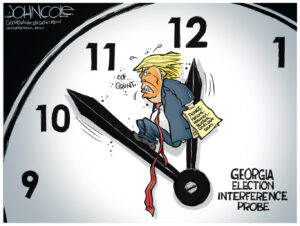
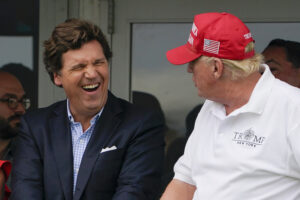
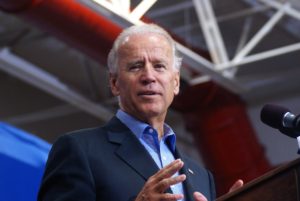
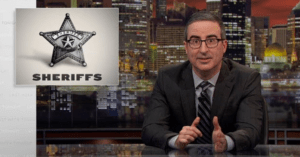

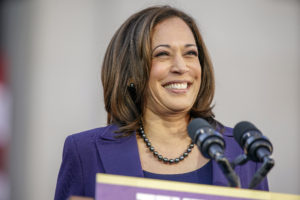


You need to be a supporter to comment.
There are currently no responses to this article.
Be the first to respond.